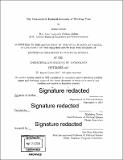The comparative political economy of working time
Author(s)
Conran, James (James Kelly)
DownloadFull printable version (21.15Mb)
Other Contributors
Massachusetts Institute of Technology. Department of Political Science.
Advisor
Kathleen Thelen.
Terms of use
Metadata
Show full item recordAbstract
The social organization of working time profoundly shapes the lives of workers, families and societies, and has historically been the subject of intense social and political contestation. Yet work time has been relatively rarely studied by political scientists. This dissertation seeks to correct this neglect by drawing attention to the important connections between work time and two much more widely studied phenomena: the growth of income inequality and the persistence of gender inequality. Using a mixed method approach, it first traces the historical development since the 19th Century of the work time regimes - the combination of work time regulations and practices - of three developed democracies: France, Germany and the United States. In three subsequent chapters, quantitative analyses of a range of surveys, in particular labor force surveys, demonstrate the ways that changes in these regimes have contributed to growing income inequality and persistent gender inequality, as well as shaping the politics of economic inequality. In particular I draw attention to a profound long term shift in the relationship between work time and social class what I refer to as a "great reversal" - whereby individuals at the top of the social hierarchy today work longer hours than those with lower status, in contrast to the work time regime described more than a century ago by Thorstein Veblen, defined by the contrast between a high-status "leisure class" and a low-status "working class". This shift has both compounded growing income inequality and helped legitimate and activate the self-interested opposition of the "working rich" to redistribution, by bolstering their sense of their own deservingness. While the "great reversal" and its consequences are shown to have occurred in each of the three cases studied, it happened earlier and went further in the United States than in Germany and, in particular, France. The study concludes that France's more highly regulated work time regime has helped limit both the rise of income inequality and the level of gender inequality on the French labor market, relative to other countries.
Description
Thesis: Ph. D., Massachusetts Institute of Technology, Department of Political Science, 2017. Cataloged from PDF version of thesis. Includes bibliographical references (pages 234-250).
Date issued
2017Department
Massachusetts Institute of Technology. Department of Political SciencePublisher
Massachusetts Institute of Technology
Keywords
Political Science.